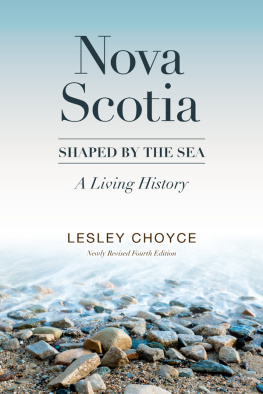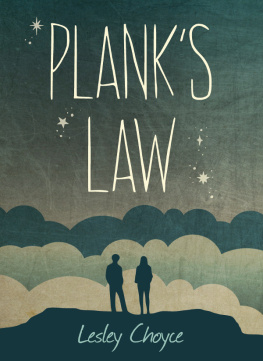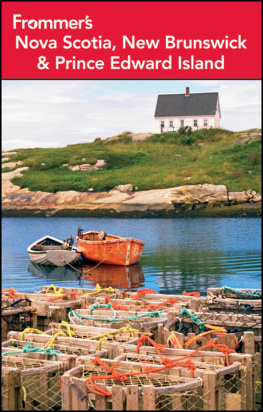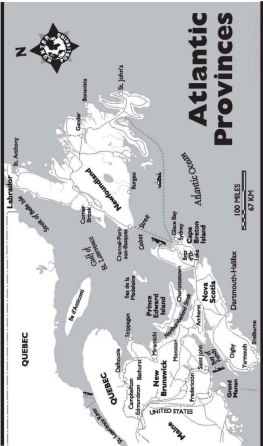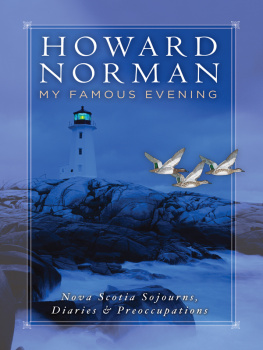Lesley Choyce - Nova Scotia
Here you can read online Lesley Choyce - Nova Scotia full text of the book (entire story) in english for free. Download pdf and epub, get meaning, cover and reviews about this ebook. year: 2020, publisher: Pottersfield Press, genre: Art. Description of the work, (preface) as well as reviews are available. Best literature library LitArk.com created for fans of good reading and offers a wide selection of genres:
Romance novel
Science fiction
Adventure
Detective
Science
History
Home and family
Prose
Art
Politics
Computer
Non-fiction
Religion
Business
Children
Humor
Choose a favorite category and find really read worthwhile books. Enjoy immersion in the world of imagination, feel the emotions of the characters or learn something new for yourself, make an fascinating discovery.
- Book:Nova Scotia
- Author:
- Publisher:Pottersfield Press
- Genre:
- Year:2020
- Rating:4 / 5
- Favourites:Add to favourites
- Your mark:
- 80
- 1
- 2
- 3
- 4
- 5
Nova Scotia: summary, description and annotation
We offer to read an annotation, description, summary or preface (depends on what the author of the book "Nova Scotia" wrote himself). If you haven't found the necessary information about the book — write in the comments, we will try to find it.
Lesley Choyce: author's other books
Who wrote Nova Scotia? Find out the surname, the name of the author of the book and a list of all author's works by series.
Nova Scotia — read online for free the complete book (whole text) full work
Below is the text of the book, divided by pages. System saving the place of the last page read, allows you to conveniently read the book "Nova Scotia" online for free, without having to search again every time where you left off. Put a bookmark, and you can go to the page where you finished reading at any time.
Font size:
Interval:
Bookmark:

Nova Scotia Shaped By The Sea
Newly Revised Fourth Edition
Lesley Choyce
Pottersfield Press, Lawrencetown Beach, Nova Scotia, Canada
Copyright 2020 Lesley Choyce
All rights reserved. No part of this publication may be reproduced or used or stored or transmitted in any form or by any means graphic, electronic or mechanical, including photocopying or by any information storage or retrieval system, without the prior written permission of the publisher. Any requests for photocopying, recording, taping or information storage and retrieval systems of any part of this book shall be directed in writing to the publisher or to Access Copyright, The Canadian Licensing Agency, (www.accesscopyright.ca). This also applies to classroom use.
Library and Archives Canada Cataloguing in Publication
Title: Nova Scotia shaped by the sea : a living history / Lesley Choyce.
Other titles: Nova Scotia
Names: Choyce, Lesley, 1951- author.
Description: Fourth edition. | Originally published as: Nova Scotia : shaped by the sea : a living history / Lesley Choyce. Toronto ; New York : Viking, 1996.
Identifiers: Canadiana (print) 20200277936 | Canadiana (ebook) 20200278223 | ISBN 9781989725153 (softcover) | ISBN 9781989725160 (EPUB)
Subjects: LCSH: Nova ScotiaHistory.
Classification: LCC FC2311 .C56 2020 | DDC 971.6dc23
Cover design by Gail LeBlanc
Back cover aerial photo: Mary Jefferson
Author photo: Linda Choyce
The original edition of this volume was published by Viking/Penguin Canada Ltd.
Pottersfield Press gratefully acknowledges the financial support of the Government of Canada for our publishing activities. We also acknowledge the support of the Canada Council for the Arts and the Province of Nova Scotia which has assisted us to develop and promote our creative industries for the benefit of all Nova Scotians.
Pottersfield Press
248 Leslie Road
East Lawrencetown, Nova Scotia, Canada, B2Z 1T4
Website: www.pottersfieldpress.com
To order, phone toll-free 1-800-NIMBUS9 (1-800-646-2879)
Printed in Canada

It is in our nature to travel into the past, hoping thereby to illuminate the darkness that bedevils the present.
Farley Mowat
Acknowledgements
Special thanks to the following who helped make this project happen: Linda Choyce, Kathleen Jones, Claire Bennet, Mary Ann Archibald, Dana James, Emily White, Jennifer Wessel, Peggy Amirault, Julia Swan, Gail LeBlanc, Erin Dunn, Dean Jobb, Malcolm Ross, Claudia Pinsent, Gary Shutlak, Dan Paul, Barrie Clarke, Karen Smith, Charles Armour, Cynthia Good, and the people of Nova Scotia.
Contents
I first stepped onto Nova Scotian soil sometime in 1969. Id driven up and down the east coast of North America looking for waves to surf and whatever adventure was available on the mostly sandy shoreline of the Atlantic Ocean. Id never located the curious version of paradise I had envisioned until I found my way to the Nova Scotian coast with its rocky shoreline, its cold pristine clear water along some breathtaking uninhabited beaches. And, of course, its incredible waves.
I moved here for good in 1978 and, as expected, realized that my mythologized version of the province was eventually replaced by a more appropriate understanding of the real thing. But my love of the place grew and never diminished. Ive lived through the storms, the politics, the endless changes, and the tragedies of the decades since, but the sea has been a constant.
In 1996, Penguin Books published the first edition of Nova Scotia: Shaped by the Sea. I am not a historian, but I did my research and fashioned the story of the past as I understood it by piecing together the timeline, the fragments, the events, and the people that shaped this province. But, more than the human history, it seemed that the single most powerful influential force was the sea itself and its never-ending impact on those of us who have lived out our lives here.
So, geologically, yes, the land has been shaped by the sea carved away, ravaged at times, drowning large parcels of real estate that still appear as headlands on old twentieth-century topographical maps. But the sea has also provided sustenance, inspiration, occupation, wealth, and even joy. Not to mention terror, heartbreak, loss, despair, and death.
Most mornings I walk the beaches of Lawrencetown and it reconnects me to the watery world not far from my doorstep. If the waves are good, I still surf. Or I find other ways to commune with the North Atlantic. The connection I feel to the sea, however, is nothing at all unprecedented or unique in any way. Im a landlubber mostly. Yet the tug of the tide is still in me. I like to think it affects me the same way that sailors from the past felt the yearning, the siren call, the demented absolute necessity to continually return to the sea.
From my observation and research, most of the history of sailing ships with humans coming and going from Nova Scotia daily or over periods of weeks and months is not at all pretty. Conditions on board British and French sailing vessels in the eighteenth and nineteenth centuries were demanding, uncomfortable, difficult at the best of times, and all too often life-threatening. Yet sailors and fishermen returned to the sea over and over. Some survived but many didnt.
The sea is in our blood is a much used phrase that, metaphorically, at least, could explain why this link to the ocean is so powerful. Yes, both seawater and blood are salty but, just for the record, seawater has three times the amount of sodium and five times the amount of chlorine. We are similar but different. Nonetheless, the sea remains our most ancient ancestral home.
My first surf session of the spring of 2020 took me to Seaforth on a blustery March day. The waves were large and erratic. The water was barely one degree above freezing, the north wind about the same. As I walked out the rock-strewn headland, the stones tumbled beneath my feet, disturbed and rearranged by recent massive storms. I was wedged inside a heavy winter wetsuit with the hood tied tight around my face.
The sea felt alien to me and I didnt like it. As I knee-paddled toward the break I felt winded, out of shape and ill-prepared to get back into the groove of surfing, something Id been doing since I was thirteen years old. Nova Scotians, like people around the world, were shell-shocked by the toll taken by the pandemic and how it had so radically changed our daily lives. I was thinking, maybe something really has changed about the world that we knew. Not just society, not just civilization. But everything.
A crazy big set of waves rolled through about then and nearly trounced me. I paddled hard to dig over a steep wall of winter water about to crash over me and send me floundering. Behind it was another and I continued to pump my arms as hard as I could to avoid wiping out. And then I was beyond the break, catching my breath, looking around. Lines of waves stretched to the horizon.
Another big set of waves rolled under me now as I worked hard to avoid the negative narrative forming in my head. What was I doing here? Did I really want a major wipeout? Was I ready for another ice-cream headache? Should I just retreat home and wait for warmer weather and smaller surf?
And then, I believe, the sun snipped a passage through the hunkering clouds above and turned the sea from gun metal grey to aquamarine blue. So I watched the swell, waited for the third wave of a modest set, and paddled as hard as my winter-weary body would allow. I caught the wave, thrust myself awkwardly to my feet, made a bottom turn, and wobbled across a head-high wall of water until it was spent in the deeper reaches of the cove.
Font size:
Interval:
Bookmark:
Similar books «Nova Scotia»
Look at similar books to Nova Scotia. We have selected literature similar in name and meaning in the hope of providing readers with more options to find new, interesting, not yet read works.
Discussion, reviews of the book Nova Scotia and just readers' own opinions. Leave your comments, write what you think about the work, its meaning or the main characters. Specify what exactly you liked and what you didn't like, and why you think so.

